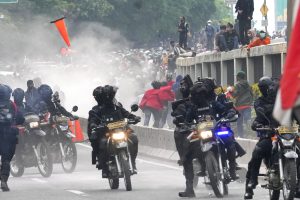Indonesian police used tear gas and water cannon to disperse hundreds of university students demonstrating yesterday in the capital Jakarta against rumored plans to extend President Joko “Jokowi” Widodo’s tenure beyond the end of his second term in 2024.
According to Reuters, hundreds of students wearing neon jackets marched toward Parliament to complain about the rising price of goods like fuel and cooking oil, and the prospect of the president maneuvering to extend his time in office, either by delaying the 2024 election or amending the Constitution to allow him to run for a third term.
“We demand that the lawmakers do not betray the country’s constitution by amending it,” said one protest organizer quoted by the Associated Press. “We want them to listen to people’s aspirations.” The media reported that the protesters were dispersed by high-pressure water cannon and tear gas before they could reach Parliament en masse, though some managed to hurl rocks into the complex. The Jakarta protest was matched by similar gatherings in large cities across the archipelago, including several on the densely populated island of Java.
The protests took place despite Jokowi stating a day earlier that he had no intention of trying to extend his stay in office beyond 2024, and that the next presidential election was firmly set for February 14 of that year. He ordered his Cabinet to communicate that to the public “so that there are no rumors circulating among people that the government is trying to postpone the election or speculation about the extension of the president’s tenure or a related third term.”
It was the second time in a week that the Indonesian leader had attempted to quash such suggestions from a number of senior politicians and cabinet members that Jokowi’s tenure could be extended in some manner. As I noted yesterday, the appearance of this plan, which threatens the democracy that Indonesia has constructed since the fall of the Suharto dictatorship in 1998, has arisen due to the fact that such a large part of the Indonesian political spectrum has a stake in Jokowi’s administration. In this context, many see an extension of their collective tenures as preferable to the uncertainty of facing the Indonesian electorate, and are evidently willing to concoct rationales for tinkering with the country’s constitution to this end.
The main rationale is that Jokowi needs more time to repair Indonesia’s economy after the chaos of COVID-19, and complete his agenda, which includes Jokowi’s ambitious and multibillion-dollar plan to build a new capital city in Kalimantan.
Another driver of yesterday’s nationwide protests was the rising costs of basic goods, particularly petrol and cooking oil, which is beginning to press on the bottom lines of ordinary people The latter was on the rise even before the Russian invasion of Ukraine, prompting the Indonesian government to begin restricting exports of crude palm oil in order to offset the local price of cooking oil. It introduced further restrictions in early March, after the Ukraine war began to push palm oil prices up to historic highs. The government later scrapped these export restrictions and increased its palm export tax and levy.
Last week, the AP reported, Jokowi told a Cabinet meeting to focus on addressing these economic fundamentals rather than floating quixotic plans for the extension of his tenure in office. “Nobody should bring up a (presidential) term extension or election delay anymore. No more!” Jokowi said. There’s not much more that the Indonesian leader can do to rule out a possible end run around the current two-term limit, but with increased upward pressure on the price of essential commodities to increase, there is every chance of yesterday’s protests recurring in the near future.

































